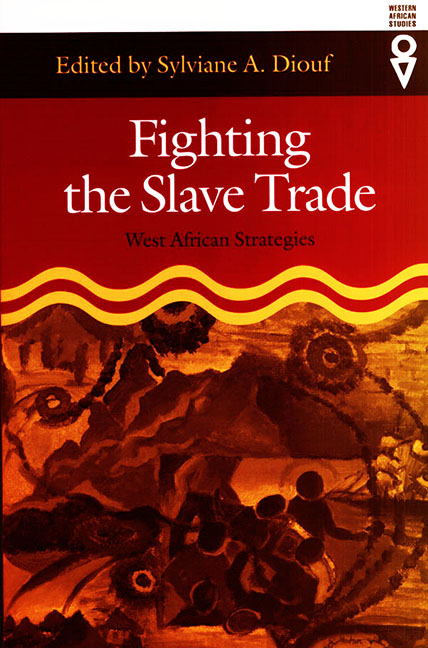Introduction
Published online by Cambridge University Press: 30 August 2017
Summary
BETWEEN THE EARLY 1500S AND the late 1860s, an estimated twelve million African men, women, and children were forcibly transported across the Atlantic Ocean. About seven million were displaced through the Sahara desert and the Indian Ocean, in a movement that started in the seventh century and lasted until the twentieth. If the idea that the deported Africans walked quietly into servitude has lost ground in some intellectual circles, it is still going strong in popular culture; as are the supposed passivity or complicity of the rest of their compatriots and their lack of remorse for having allowed or participated in this massive displacement. In recent years, a few works have investigated the feeling of guilt apparent in some tales and practices linked to the Atlantic slave trade, but the Africans’ actions during these times, except in their dimension of collaboration, have hardly been explored (Iroko 1988; Austen 1993; Shaw 2002).
This collection of essays seeks to offer a more balanced perspective by exploring the various strategies devised by the African populations against the slave trade. It is centered on the Atlantic trade, but some chapters cover strategies against the trans-Saharan and domestic displacement of captives, and these analyses suggest that strategies against the slave trade were similar, irrespective of the slaves’ destination. The book focuses on a single area, West Africa, in order to provide a sense of the range of strategies devised by the people to attack, defend, and protect themselves from the slave trade. This evidences the fact that they used various defensive, offensive, and protective mechanisms cumulatively. It also highlights how the contradictions between the interest of individuals, families, social orders, and communities played a part in feeding the trade, even as people fought against it. Therefore, this book is not specifically about resistance, which is arguably the most understudied area of slave trade studies—with only a few articles devoted to the topic (see Wax 1966; Rathbone 1986; McGowan 1990; Inikori 1996). Resistance to capture and deportation was an integral part of the Africans’ actions, but their strategies against the slave trade did not necessarily translate into acts of resistance. Indeed, some mechanisms were grounded in the manipulation of the trade for the protection of oneself or one's group.
- Type
- Chapter
- Information
- Fighting the Slave TradeWest African Strategies, pp. ix - xxviiiPublisher: Boydell & BrewerPrint publication year: 2004

